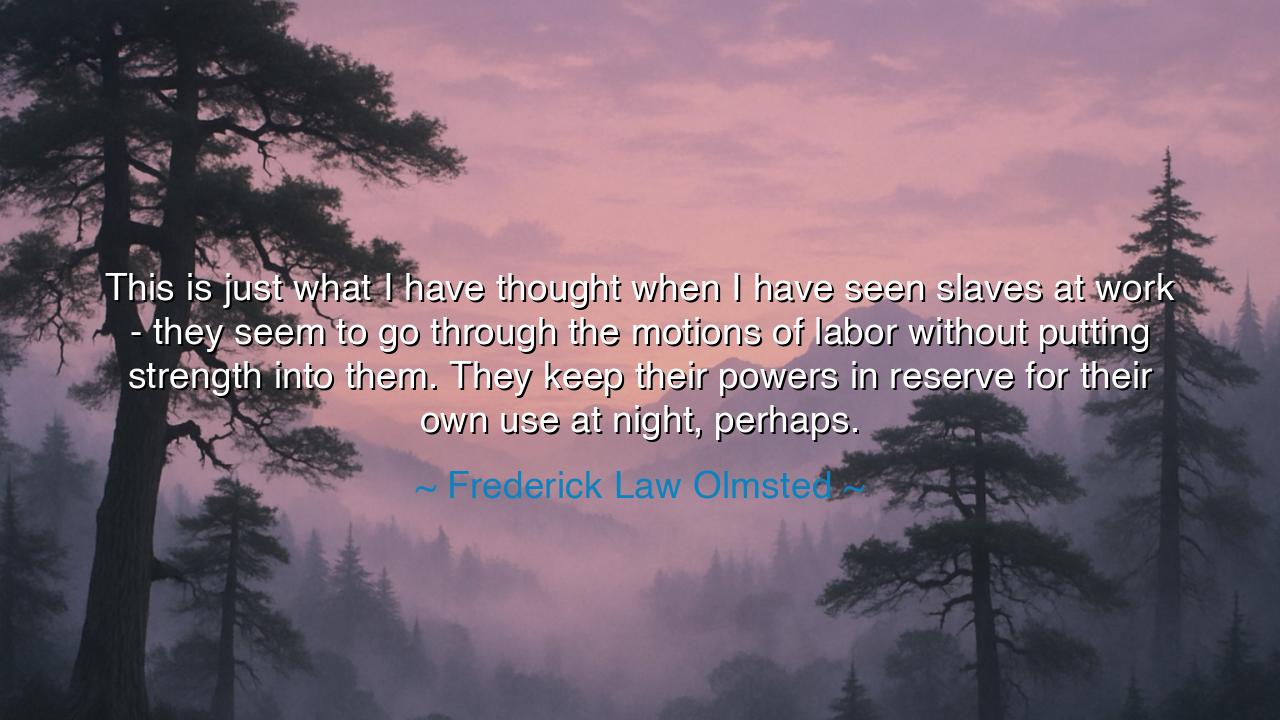
This is just what I have thought when I have seen slaves at work
This is just what I have thought when I have seen slaves at work - they seem to go through the motions of labor without putting strength into them. They keep their powers in reserve for their own use at night, perhaps.






Hear the piercing observation of Frederick Law Olmsted, traveler, thinker, and witness to the wounds of slavery: “This is just what I have thought when I have seen slaves at work—they seem to go through the motions of labor without putting strength into them. They keep their powers in reserve for their own use at night, perhaps.” These words are not idle musings, but a revelation of human defiance. They show us that even in chains, the enslaved refused to give all of themselves to their oppressors. They gave the body by day, but kept the spirit in reserve, hidden, preserved for moments of their own choosing.
Olmsted’s quote comes from his travels through the American South, where he studied with the eyes of a reformer the system of bondage that drained life from millions. In what he saw, the enslaved performed their tasks, yet often without the fervor of free labor. Why? Because to give strength fully to a master was to surrender the last remnant of the self. Instead, they kept their best energies in secret, saving them for song, for fellowship, for love, for survival. Thus, even in forced servitude, they guarded a portion of their dignity and humanity.
This hidden strength reminds us of an eternal truth: the oppressor may command the body, but never wholly the soul. In ancient Rome, the gladiators fought at the whim of emperors, yet in their barracks, they shared stories, built brotherhood, and dreamed of freedom. In the fields of America, slaves appeared bent, weary, and broken, yet at night their voices rose in spirituals, songs carrying coded messages of escape, of resistance, of hope. Outwardly weak, inwardly strong—they preserved the flame within.
Consider the story of Harriet Tubman, who herself appeared as one of the oppressed by day, yet by night turned her strength into action. She guided her brothers and sisters along the Underground Railroad, outwitting masters and hunters alike. She exemplified Olmsted’s vision: strength withheld from the lash, channeled into liberation. What seemed like mere endurance by day became astonishing courage by night. This is the secret of resilience—the power to disguise one’s strength until the hour comes to use it for freedom.
Olmsted’s reflection also unmasks the lie of slavery itself. Slaveholders claimed that bondage made men and women lazy, unproductive, or inferior. But what Olmsted saw proved otherwise: the enslaved were not without power, but rather they withheld their strength deliberately, refusing to waste it in a system that denied them justice. In truth, their restraint was a form of silent rebellion, a refusal to give their full selves to a world that treated them as property.
Learn from this, O seeker: there is a wisdom in guarding your strength. Not every battle deserves your full energy; not every master is worthy of your labor. Know when to hold back, when to preserve your powers for the moment they can bring life and freedom. Like the enslaved who sang in the night, keep within yourself a reservoir of courage that no tyrant, no hardship, no cruelty can drain.
Therefore, let your action be this: do not squander your best self on what enslaves you—whether it be fear, vanity, or oppression of any form. Channel your hidden powers into the pursuits that nourish your soul, into the struggles that bring justice, into the tasks that build a better tomorrow. For true strength is not only in what is shown, but in what is saved, guarded, and used with wisdom.
Thus is the teaching of Olmsted: even the enslaved, denied freedom by day, could still preserve a sacred portion of strength for themselves, for one another, for the hope of liberation. So too must you preserve your inner flame, giving it not to chains, but to the causes of life, of love, and of freedom everlasting.






AAdministratorAdministrator
Welcome, honored guests. Please leave a comment, we will respond soon